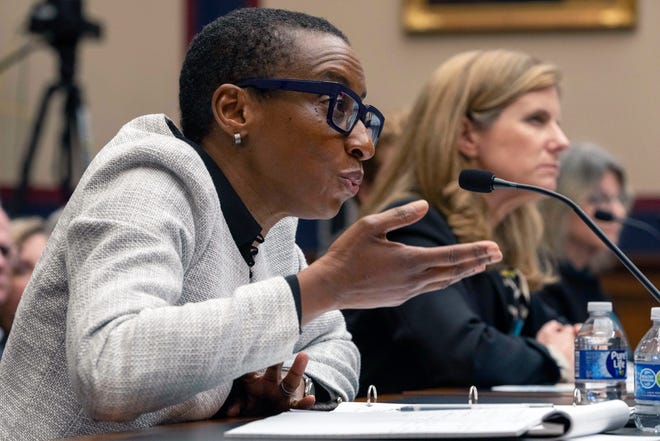During this summer, a team of students from MIT embarked on a journey to the sou …
Calls for resignation increase as Ivy League universities face mounting pressure to confront antisemitism
Jennifer Livingstone

WASHINGTON − The pressure is building on two Ivy League universities and the Massachusetts Institute of Technology following a heated congressional hearing earlier this week on combating the rise of antisemitism on U.S. campuses in the aftermath of the Oct. 7 Hamas-led terror attacks in Israel.
A group of 13 House Democrats penned a letter on Friday to the heads of Harvard University, MIT, and the University of Pennsylvania, seeking policy revisions to address antisemitism on campus.
Rep. Kathy Manning, D-N.C., led the letter, which came days after Republican Rep. Elise Stefanik of New York engaged in a viral exchange with the three university presidents regarding campus policies on antisemitism. During a House Education and the Workforce Committee hearing, the presidents discussed the uptick in anti-Jewish and anti-Muslim attacks since Hamas attacked Israel on Oct. 7 and Israel responded by invading Gaza.
Stefanik authored a separate letter on Friday signed by more than 70 primarily Republican lawmakers, calling for the removal of the university presidents in response to the hearing.
Harvard’s Claudine Gay, the University of Pennsylvania’s Liz Magill, and MIT’s Sally Kornbluth condemned hatred towards both groups and discussed efforts to enhance campus security.
Stefanik posed a question to the presidents about whether “calling for the genocide of Jews” would violate their codes of conduct. Gay stated that antisemitic speech would breach university policies when it “crosses into conduct,” and Magill similarly remarked that it would constitute harassment if “speech becomes conduct.” Kornbluth stated that it would be “investigated as harassment if pervasive and severe.”
Picking a college is already difficult.The Israel-Hamas war is making it even tougher.
The comments received immediate backlash, including from the White House. “It’s unbelievable that this needs to be said: Calls for genocide are monstrous and antithetical to everything we represent as a country,” said White House spokesperson Andrew Bates in a statement.
On Friday, Manning’s group of mainly moderate Democrats joined the chorus, stating in the letter addressed to each university’s governing board that the testimony “did nothing to alleviate our concerns” regarding antisemitic incidents on college campuses.
“Instead, the presidents’ unwillingness to answer questions clearly or fully acknowledge appalling and unacceptable behavior – behavior that would not have been tolerated against other groups – illuminated the problematic double standards and dehumanization of the Jewish communities at your universities,” they wrote. “The lack of moral clarity these presidents displayed is simply unacceptable.”
They urged the universities to update their codes of conduct to ensure the protection of students and detail the actions taken to safeguard Jewish and Israeli students and staff.
On Oct. 7, Hamas militants entered Israeli towns near the Gaza strip, resulting in the deaths of at least 1,200 people and the abduction of nearly 200 civilians. In response to the attack, Israel launched airstrikes in Gaza, leading to weeks of destructive assaults. According to the Gaza Health Ministry, nearly 17,500 individuals have died and over 56,000 have been injured.
The ongoing conflict has caused turmoil on college campuses, with some violent clashes occurring during demonstrations. Students aligned with both sides have expressed concerns about their safety as tensions persist.
The testimonies of the university presidents sparked calls for their resignations and triggered outrage among faculty, policymakers, and others concerned that these prestigious institutions would not sufficiently protect Jewish students from antisemitism on campus. Gay and Magill have publicly apologized for their statements during the hearing.
“I got caught up in what had become at that point, an extended, combative exchange about policies and procedures,” affirmed Gay in an interview with the Harvard Crimson. “What I should have had the presence of mind to do in that moment was return to my guiding truth, which is that calls for violence against our Jewish community − threats to our Jewish students − have no place at Harvard and will never go unchallenged.”
Columbia University declined to testify
Minouche Shafik, president of Columbia University, a prestigious Ivy League institution in New York City, previously declined an invitation to attend the contentious hearing on Tuesday due to scheduling conflicts, according to committee spokesperson Nick Barley.
Like the other presidents, her first year in office has been largely overshadowed by disruptive campus protests and controversies stemming from disagreements surrounding the Israel-Hamas war, which have significantly impacted selective schools in the northeastern region.
Israel-Hamas war:Free-speech battles erupt across U.S. colleges
Federal investigation underway into antisemitism and Islamophobia on campuses
Columbia, along with Harvard and the University of Pennsylvania, is presently under investigation by federal civil rights authorities. The investigation commenced in November, and although it remains unclear what type of discrimination is being alleged in the complaint to the Education Department, the agency confirmed last month that the investigation at Columbia was one of seven explicitly identified at the time as relating to antisemitic or anti-Muslim harassment.
In recent weeks, the university has also faced scrutiny for suspending two anti-Zionist student groups, Jewish Voice for Peace and Students for Justice in Palestine. Administrators argued that the clubs had violated event policies. However, the campus newspaper, the Columbia Daily Spectator, revealed that those policies had been quietly amended a few weeks prior to the suspension of the groups.

